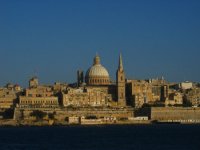EU Maritime and Fisheries policies – towards sustainability and growth

Hearing at the Foreign and European Affairs Committee of the Maltese House of Representatives
Valletta, 14 June 2012
Commissioner Maria Damanaki visited Malta to discuss maritime policy issues and the reform of the Common Fisheries Policy with the Prime Minister Lawrence Gonzi and Ministers Pullicino, Gatt, De Marco, Members of Parliament and local stakeholders. Ms Damanaki discussed the views of the Maltese Parliament on the EU Integrated Maritime Policy and on the reform of the Common Fisheries Policy with the members of Foreign and European Affairs Committee of the House of Representatives, before meeting fishermen's associations, non-governmental organisations and representatives of the aquaculture sector.

Mr President, Honourable Members of Parliament,
It is very nice to be here in Malta today. It was time, we have many things to discuss, and I am looking forward to our debate.
I would like to start by touching upon some key elements of our fisheries policy.
One of our urgent problems is the reform of our fisheries system.
We all agree that healthy, strong fish stocks are the pre-requisite for a healthy and strong fishing industry.
Certainly, fish stocks at sustainable levels by 2015 is an ambitious goal for us all. But I don’t think we can put it off any longer.
In parallel, discards need to be fought head-on and fishing capacity needs to be reduced. Moreover, many might be sceptical towards the transferable fishing concessions, but nobody seems to be able to suggest a valid alternative.
Meanwhile, with too many vessels and too few fish, fishermen can't make a living anymore.
All the components of our plan, from MSY by 2015 to TFC's for bigger vessels, from better governance to greater selectivity, are fundamental ingredients to re-launch the industry, create safe and attractive jobs and position Europe strongly on the international market.
And let us not forget that the reform also stresses other drivers for growth that are of primary importance for this country: sustainable aquaculture and the development of coastal areas.
For all these reasons I think we have to go for this ambitious plan for reform, no matter how difficult, and simply focus on helping fishermen at this time of change.
The Fisheries Council on 12 June was a real step forward. It endorsed Maximum Sustainable Yield (from 2015 and 2020 at the latest) and has subscribed to a real discard ban with clear end-dates. It is a fact that the Commission proposal is more ambitious.
It is now up to the European Parliament to give its views on the Commission proposal.
On financing, the generous envelope we have proposed - 6.5 billion euro for the period from 2014 to 2020 – is largely meant to help the fishermen, the people who make up the industry.
We need to help small-scale fishermen adopt sustainable practices; and we need to encourage some of them move away from fishing and find new branches of activity in the maritime economy, using their maritime know-how on alternative occupations.
This means shifting the focus away from a heavy-impact activity like fishing towards smart and green activities like marine tourism or sea cleaning – in short, toward smart growth.
With regard to the external dimension of our fisheries policy, the EU also needs to take a leading and dynamic role within regional management organisations, to defend the principle of sustainability and also to create a level-playing field with our Mediterranean neighbours.
In this context, it is absolutely paramount that the ICCAT Recovery plan for bluefin tuna is successful and the stock rebuilds. I count on your support to the EU's position there: we must enforce all ICCAT and EU rules with a very firm hand.
I realize that we are in Bluefin tuna season and that all farming activities, from transfer to the farms to harvesting and trade, present enormous control challenges and use up resources - especially for a small country like Malta. But control is vital to keep our fishing within sustainable levels. And I want to thank the Maltese government for their recent efforts in cooperation with the Commission.
Ladies and gentlemen,
Malta has vital interests also beyond fisheries and today I would like to mention at least two of the complex maritime issues the Commission is working on at the moment.
The first essential issue is security. In this globalized world, monitoring the external border around Malta's territorial waters or throughout the Mediterranean is quite a challenge.
Yet maritime piracy, illegal fishing, trafficking of weapons, drugs and people are real day-to-day threats. They make Europe’s maritime economy more costly and less competitive; they affect justice, human rights and global governance.
Today many different bodies monitor the seas with sophisticated systems. But they don’t necessarily share the data collected with each other. This fragmentation leads to inefficiencies. Moreover, it prevents us from delivering the optimal responses to accidents at sea.
Therefore, we are now working on a "common environment" to connect more than four hundred authorities for the surveillance of the entire EU maritime domain.
By the way, I wish to thank the Maltese Armed Forces for their participation in the BlueMassMed pilot project during the past two years. All surveillance authorities in Malta should be coordinated even more closely and you should continue working with us on this project. It is a project that will help us do more – at no additional cost.
The second aspect I would like to mention is growth. A very important source of sustainable growth and employment for Malta is tourism, and the Commission plans to adopt a Communication on Coastal and Maritime Tourism next year. We will address the issues of sustainability, seasonality, product diversification and competitiveness.
The sea can offer many economic opportunities, if we use it sustainably. In that vein, smart blue growth will be the focus of the Ministerial Conference on the Integrated Maritime Policy that will be held in Limassol in October. I hope that you will be actively engaged and lending the highest support to the Cypriot Presidency.
Last but not least, to my great pleasure, Valletta will be hosting the next edition of European Maritime Day in 2013. This event always raises the visibility of maritime sectors. And building on Malta's impressive maritime success story, there would be no better place to show to Europe what marine and maritime sectors can do for the overall economy.
Honourable Members of Parliament, Ladies and Gentlemen,
With the Rio+20 conference taking place this month, we are reminded of many challenges that are especially relevant to this country: the quality of waters, the depletion of fish stocks, and the vulnerability of islands to climate change.
It is time we start investing on these wider issues. Our effective response to them today will bring progress for the future. Over the next years, we need to focus on people and help them understand the need for, and embrace change. We need to boost employment in fishing communities and sea-related sectors. And we need to promote sustainability, for a strong economy in Europe.
The EU's Fisheries Policy and Maritime Policy can sustain this process. And Malta is invited to play a key role in it and make an important contribution.
Thank you.


